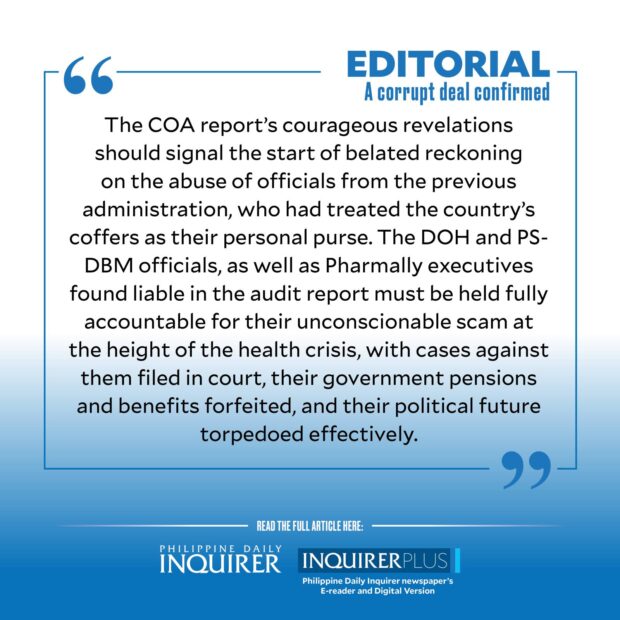A corrupt deal confirmed

Even as far back as 2021, when the Senate Blue Ribbon committee started its probe into what seems to be an anomalous transaction, people already had serious doubts about the soundness and integrity of the deal between the Department of Health (DOH) and the little-known firm Pharmally, involving the purchase of COVID-19 supplies.
Among the red flags noted by the Senate committee was the company’s P625,000 capitalization that shouldn’t have qualified it to bid for government contracts worth billions of pesos. Additionally, its hasty deliveries of DOH orders did not follow established procurement procedures that could have served as a backstop to prevent corrupt dealings. Not surprisingly, such shortcuts resulted in supplies later found to be overpriced and substandard.
This week, the Commission on Audit (COA) confirmed such public perception of irregularities in the deal, with a report citing the lapses committed by the DOH and the Procurement Service of the Department of Budget and Management (PS-DBM) in the handling of funds and purchase of COVID-19 supplies at the peak of the pandemic.
In its special audit report on the government’s multibillion-peso deals with Pharmally Pharmaceutical Corp., the COA noted the “shortcomings” of the two government agencies and the “various participation” of their top officials—including the former health secretary and several former undersecretaries—in sealing the P11.5 billion contracts.
Among other findings, the COA said that DOH had “failed to coordinate with PS-DBM on the timeliness of the procurement, schedule of deliveries, and periodical consumption of supplies,” noted Sen. Juan Edgardo “Sonny” Angara who, as chair of the Senate finance committee, spoke on behalf of COA during plenary deliberations on the agency’s 2024 budget.
The report also found that the DOH did not “exert effort in monitoring the liquidation of fund transfers to PS-DBM” amounting to P42 billion, while the PS-DBM failed to “determine the availability and capability of the supplier [Pharmally] to provide the required quantity.” There was also “no request for further negotiation from two entities who offered to supply the contracts.”
The COA thus managed to establish the culpability of both agencies and their officials in collusion with Pharmally, with the apparent intent to defraud government of billions of pesos in taxpayer money. It’s a feat that the 2021 Senate inquiry led by former senator Richard Gordon had failed to achieve in its grueling hearings, as government and Pharmally witnesses dodged pointed questions, claimed self-incrimination, or issued contradictory statements. Though the Senate report was archived for lack of signatures, the Office of the Ombudsman recommended graft charges against three PS-DBM officials and several Pharmally executives in August this year.
COA’s confirmation of corruption in the Pharmally deal puts into question the Supreme Court ruling on Nov. 12, which said that the Senate had committed grave abuse of discretion when it cited in contempt and ordered the arrest of Pharmally executives Lincoln Ong and Michael Yao Hung Ming. Such acts, the high court said, violated the defendants’ right to due process. The ruling was understandably slammed by Gordon, who protested that it could affect the legislature’s power to detain uncooperative resource persons during its investigations.
“It sets a damaging precedent against the legislature, as a coequal branch of government. It blunts one of the only few potent tools available to the Senate in pursuing accountability, truth, and justice,” Gordon lamented.
The billions lost in the irregular transactions could have been used for the benefits of frontline health workers who put their lives on the line fighting COVID-19.
Indeed, the high tribunal’s decision seems to have watered down whatever vindication the Senate committee would have felt with the COA report’s validation of its hearings’ earlier findings. Will the upper chamber now be constrained to use kid’s gloves when interrogating hostile witnesses, especially top officials who, as seen in the Pharmally probe, had used their rank and position to silence government functionaries and escape accountability?
The COA report’s courageous revelations should signal the start of belated reckoning on the abuse of officials from the previous administration, who had treated the country’s coffers as their personal purse. The DOH and PS-DBM officials, as well as Pharmally executives found liable in the audit report must be held fully accountable for their unconscionable scam at the height of the health crisis, with cases against them filed in court, their government pensions and benefits forfeited, and their political future torpedoed effectively.
The high court’s confusing ruling aside, the COA report affirms that truth always has a way of surfacing despite previous obfuscations, threats, and stonewalling. All it takes is a few brave souls diligently scouring and documenting evidence for the difficult process of establishing transparency and accountability to take hold.
For more news about the novel coronavirus click here.
What you need to know about Coronavirus.
For more information on COVID-19, call the DOH Hotline: (02) 86517800 local 1149/1150.
The Inquirer Foundation supports our healthcare frontliners and is still accepting cash donations to be deposited at Banco de Oro (BDO) current account #007960018860 or donate through PayMaya using this link.
















